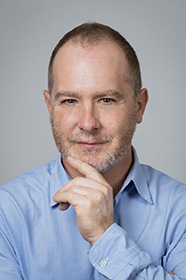Head of Department
Email jesse.bering@otago.ac.nz 
Tel +64 3 471 6147
Jesse Bering is a research psychologist and Head of the Department of Science Communication. His primary research area is the cognitive science of religion, with his work centered on the cognitive underpinnings of afterlife beliefs. He is also interested in how we ascribe purpose to inherently meaningless life events as a consequence of our species' evolved psychology, most notably as an artifact of our social cognition. More recently, using controlled studies he has begun to explore people's ability to cognitively reconcile religious and scientific beliefs when they are faced directly with experiences or information that challenges their worldviews.
Bering is also an essayist and popular science writer specializing in evolution and human behavior. In addition to writing extensively for Scientific American and Slate, his essays and opinion pieces have appeared in, The New York Times, The Guardian, The Telegraph, Discover, Aeon, and others.
Bering's first book, The Belief Instinct: The Psychology of Souls, Destiny, and the Meaning of Life (W. W. Norton, 2011), was included in the American Library Association's Top 25 Books of the Year and voted one of the “11 Best Psychology Books of 2011” by The Atlantic.
This was followed by a collection of his Webby-award nominated essays, Why Is the Penis Shaped Like That? (Farrar, Straus, and Giroux/Scientific American Press, 2012), and Perv: The Sexual Deviant in All of Us (2013, Farrar, Straus, and Giroux/Scientific American Press), a taboo-breaking work that received widespread critical acclaim and was named as a New York Times Editor's Choice.
His book Suicidal (University of Chicago Press, 2018, published in the UK as A Very Human Ending, Doubleday), about the psychology of suicide, was described by the Evening Standard as “transcend[ing] its own objectives… It is a fascinating, thoughtful, unflinching meditation on one of the most intriguing and curious aspects of the human condition.”
His latest book, The Incredible Afterlives of Dr Stevenson, will be published in 2025.
Bering's books have been translated into many different languages.
As a practicing science communicator, he has also been featured in numerous documentaries, TV shows, podcasts, and radio programs, including Through the Wormhole with Morgan Freeman, The Story of God with Morgan Freeman, Conan, Chelsea Lately, Q&A (Australia), NPR's All Things Considered, and the BBC.
To learn more, visit www.jessebering.com
Current teaching
- SCOM 432 The Craft of Storytelling (Semester 1)
- SCOM 434 Science Communication Internship
- APPS 597 Supervised Independent Study
Research interests
- Cognitive science and religion
- Human sexuality
- Suicidology
- Evolutionary psychology
- Social psychology and science communication
Potential postgraduate projects
- Communicating controversial scientific topics in conflict with religious beliefs
- Experimental (lab-based) approaches to social psychology and science communication
- Cognitive biases and science communication
Current PhD students
- Alex Gilbert – Risk communication of sports-related concussion
- Emma Harcourt – The use of scientific language by anti-abortion groups
- Mahfudza Ulfa – Indonesian scientists’ perception of religion and science
- Ryan Harcourt – Effect of religious beliefs on health beliefs and behaviours
- Sean Lennon – Suicide in Aotearoa: The lived experiences of queer youth